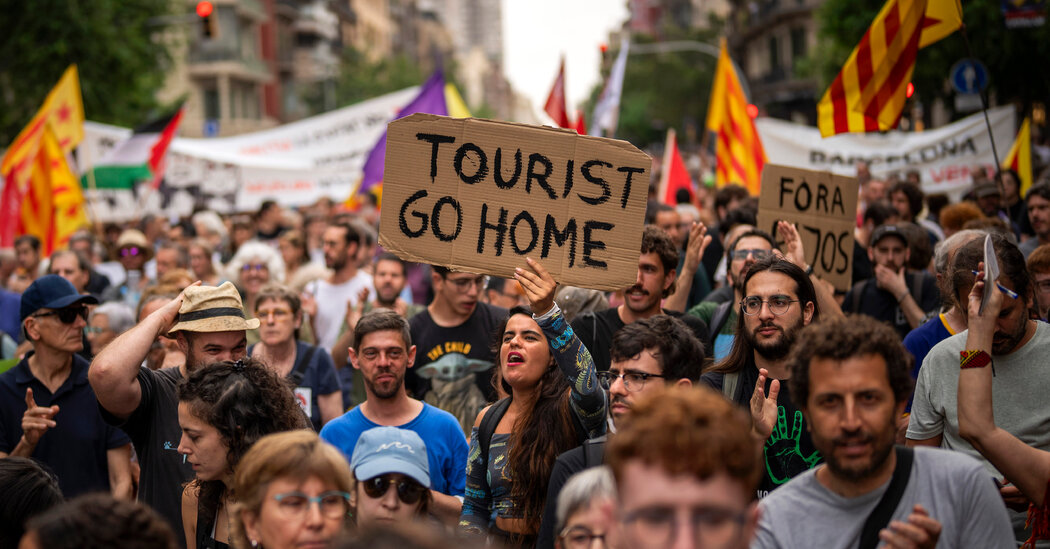Exploring the impact of mass tourism on cities, particularly Barcelona, reveals a growing conflict between visitors and local communities. The city’s vibrant streets, filled with tourists, have begun to face a significant pushback from residents, underscoring the urgent need for a balance between tourism and community well-being.
A City Under Pressure
On April 27, 2024, a memorable protest unfolded near the iconic Sagrada Familia. A tour bus was halted, doused with water, and adorned with a striking banner proclaiming the need to “put out the tourism fire.” This event encapsulated the rising tensions between the tourism industry and local inhabitants, as the city’s charm becomes a double-edged sword.
Barcelona has become a symbol of resistance against the detrimental effects of overwhelming tourism. The past year has seen similar uprisings in other popular Spanish destinations, such as the Canary Islands, Málaga, and the Balearic Islands. It appears that many locals are fed up, and public spaces are now adorned with graffiti urging tourists to “go home.” The sentiment is not aimed at tourists but rather at the unsustainable tourism practices that have forced many residents out of their neighborhoods.
The Resurgence of Tourism
With international travel rebounding post-pandemic, Barcelona witnessed an explosion of tourists returning en masse. This surge exacerbated existing frustrations as communities grappled with altering urban landscapes that favored visitors over residents. Concerns regarding housing shortages, job security, and environmental degradation are central to these debates. The privatization of public areas and the hosting of high-profile events, such as the 2024 America’s Cup, have heightened these issues, providing minimal benefits to locals.
The protests signal a “enough is enough” attitude from residents, who view their struggles as more than mere inconveniences—these movements highlight inherent inequalities and conflict over urban space, social justice, and the unchecked power of the tourism sector.
A Rising Wave of Activism
The anti-tourism movement in Barcelona gained momentum in the mid-2010s, especially in neighborhoods like Barceloneta. Organizations such as the Neighbourhood Assembly for Tourism Degrowth (ABDT) emerged, advocating for a shift away from dependence on tourism-based revenue. In contrast to the term “overtourism,” ABDT prefers “touristification,” emphasizing that the root problems lie in structural inequalities and capitalism rather than visitor numbers alone.
This recent activism reflects a strategic shift toward not only voicing opposition but presenting constructive proposals. During a major demonstration in July 2024, activists unveiled a manifesto that called for measures to lessen economic reliance on tourism. This included regulations on short-term rentals, a reduction in cruise ship traffic, and improved labor conditions within the sector. The movement has gained momentum, culminating in a coordinated demonstration across Southern Europe in June 2025.
Impact on Underserved Communities
Anti-tourism activists often face backlash, branded as “tourismphobic” or “NIMBYs” (not in my backyard). However, the consequences of tourism often disproportionately affect marginalized groups, including renters, migrants, and seasonal workers. Advocacy groups are broadening their focus to encompass a range of societal issues such as housing rights, labor conditions, climate action, and public space preservation.
By confronting interconnected challenges like labor division and gender inequalities, these movements reveal a strong desire among residents to prioritize community welfare over mere economic gain.
The Shortcomings of Experts
Policy makers and academics are falling short in terms of addressing the root concerns of these protests. Discussions often revolve around concepts like spatial management and sustainable tourism but rarely consider the experiences of residents directly impacted by tourism’s growth. Consequently, existing policies focus on managing visitor flows rather than curbing tourism’s influence on urban life and local economies.
Tourism’s reliance on temporary, low-wage labor raises questions about job quality in the industry, an aspect often overlooked in pro-tourism rhetoric. For sustainable change, there’s a pressing need for in-depth research that examines the socio-economic dynamics of tourism, leading to informed policy-making that serves community interests.
Movements should be recognized as integral to broader social justice struggles, emphasizing the creation of inclusive alternatives that prioritize community well-being over unchecked economic growth.
Conclusão
The situation in Barcelona highlights a complex interplay of tourism, community, and socio-economic dynamics. As communities push against overwhelming tourism pressures, it becomes clear that residents seek more than just coexistence with visitors—they desire a thriving urban landscape that considers all its inhabitants. By utilizing platforms like LocalsRide.com, travelers can ensure a more personalized experience, choosing specific vehicles and services that align with community-focused travel. As this movement develops, it serves as a reminder of the importance of prioritizing local interests and maintaining transparency and reliability in travel arrangements.
In summary, the struggle for balance between tourism and community well-being in Barcelona rightly draws attention, showcasing shared concerns about the future of urban life in destinations around the globe. With LocaisRide, individuals can navigate this landscape, making well-informed decisions regarding their travel needs while supporting local economies, ultimately creating a more harmonious travel experience. For flexible travel options tailored to personal preferences, Reserve a sua viagem em LocalsRide.com.

